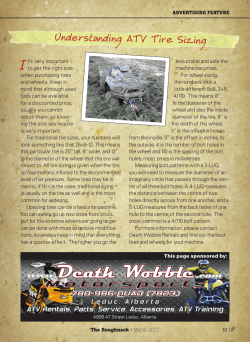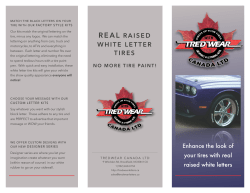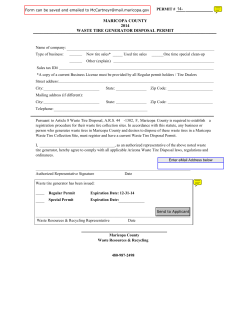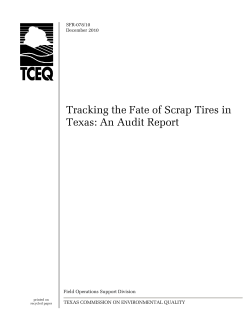
Document 109384
Environmental Enforcement Roundtable Tires - Generation, Storage and Transport Jason Ybarra, Team Leader TCEQ Houston Waste Section October 13, 2011 10:00 AM to 12:00 PM Houston-Galveston Area Council Conference Room A, 2nd floor Tire Code Scrap Tire Management in Texas DISCUSSION TOPICS TCEQ Scrap Tire Registration Program Health and Safety Code, SW Disposal Act, 361.112 30 TAC 328, Subchapter F, Purpose: Requirements for the safe storage, transportation processing utilization, and disposal of used or scrap tires or tire pieces Manifesting Types of TCEQ Registration Authorizations Location of Authorized Scrap Tire Storages Sites Location of Unauthorized Tire Sites Scrap Tire End Uses Challenges of Abandoned Tire Stockpiles Tire Fires General Used/Scrap Tire Information ▪ Texas generates an estimated 24 million used/scrap tires annually (essentially 1 tire per person) ▪ Significant reduction in stockpiles of whole scrap tires and tire pieces since FY 2000: ▪ January/2000 – ▪ Stockpile more than 65,000,000 (whole scrap tires) ▪ December/2010 – ▪ Stockpile less than 15,000,000 (whole scrap tires) Scrap Tire Management Types of Registrations for the State ◦ ◦ ◦ ◦ ◦ Generators – 12,000 Registered Facilities Transporters – 620 Registered Facilities Scrap Tire Facilities – 98 Registered Facilities Tire Storage Sites – 12 Registered Facilities Transportation Facilities – 1 Registered Facilities ◦ Land Reclamation Project Using Tires (LRPUT)– 7 Active Projects Generator An entity that is a fleet operator, an automotive dismantler, or is a whole new or used tire retailer, wholesaler, manufacturer, recapper, or retreader. (30 TAC 328.56) ▪ ▪ ▪ Generator that Stores less than 500 tires ▪ No Registration Required Stores more than 500 tires – ▪ Generator Registration Required ▪ Good used tires must be sorted, marked, classified, and arranged in an organized manner for sale to the consumer. Generators....... ▸ May transport between businesses or to an authorized facility without transporter registration ▸ Must comply with manifesting requirements Transporter An entity that collects and transports used or scrap tires and tire pieces to an authorized scrap tire facility. (30 TAC 328.57) ▪ Must comply with manifest requirements ▪ Name, Place of Business and TCEQ ID No. must be properly displayed on sides and rear of trailers and trucks. ▪ Must transport used and scrap tires and tires pieces to an authorized scrap tire facility. ▪ Must File an Annual Report Manifesting - Generator Generators shall obtain from the transporter collecting tires from their place of business and maintain a record of each individual load of used or scrap tires or tire pieces hauled off from their business location.The record shall be in the form of a five-part manifest or other similar documentation approved by the executive director. The generator shall complete the information pertaining to generator name, address, and telephone number, number of tires removed on the manifest, and registration number, if applicable.The generator shall indicate the destination of all used or scrap tires or tire pieces removed from the business location. A representative of the generator shall sign the manifest acknowledging that the information on the manifest is true and correct. Manifesting -- Transporters The transporter shall complete the information on the manifest pertaining to transporter name and registration number and the transporter's driver's license number and the state where the license was issued. The transporter shall record the number and type of scrap tires removed from the generator and delivered and the location of any whole used or scrap tires removed from the load and delivered. Transporters shall maintain a manifest record of each individual collection and delivery. The transporter shall sign the manifest acknowledging that the information on the manifest form is true and correct. If the transporter removes, for beneficial reuse, all tires from an individually manifested load, the transporter shall return the original manifest to the generator within 60 days of the date of collection. Manifesting – Authorized Facility The authorized facility accepting delivery of the used or scrap tires or tire pieces shall complete the information on the manifest pertaining to the authorized facility identification and number or weight of tires or tire pieces accepted for delivery. A representative of the authorized facility shall sign the manifest acknowledging that the information on the manifest form is true and correct. The authorized facility shall ensure that the top original of the five-part manifest is completely filled out and returned to the generator within 60 days of the date and time of collection as indicated in Section 1 of the manifest. Manifesting A generator shall obtain the completed manifest within 60 days after the scrap tires or tire pieces were transported off-site by the transporter. The generator shall notify the appropriate commission regional office of any transporter or authorized scrap tire facility that fails to complete the manifest, alters the generator portion of the manifest, or fails to return the manifest within three months after the off-site transportation of the used or scrap tires or tire pieces. Manifesting Originals of manifests, work orders, invoices or other documentation used to support activities related to the accumulation, handling, and shipment of used or scrap tires or scrap tire pieces shall be retained by the generator for a period of three years. All such records shall be made available to the executive director upon request. Any change made to the face of an original record shall be made by drawing a single line through the item being changed, ensuring that the item remains legible and readable. To the side of the mark, the person making the change shall place his or her initials with the date of such change. Any change made to the face of an original record shall be accompanied by a written justification stating the reason and purpose for the change. This written justification shall be prepared simultaneously with the change to the original record, attached to the original record, maintained at the designated place of business for a period of at least three years, and made available to the executive director upon request. The justification shall include the date of the change, and the full name and position of the individual making the change. Should the executive director identify discrepancies/errors in records, an opportunity will be given to justify, in writing, any such errors or discrepancies. What is an Authorized Facility? 30 TAC §328.53 Definitions ◦ Authorized Scrap Tire Facility: A facility authorized to accept scrap tires including, but not limited to, a registered scrap tire storage site, scrap tire facility (processor, recycler, energy recovery), or permitted landfill. This would include a LRPUT. ◦ Scrap Tire Facility: A facility that processes, conducts energy recovery, or recycles used or scrap tires or tire pieces. ◦ Beneficial Use Projects: May be considered an authorized end use facility if they have met the requirements as stipulated in the TCEQ “Guidance for Projects Involving the Beneficial Use of Used or Scrap Tires” (form No. 10302) Local Authority Notifications or Authorizations If storing or processing on-site, entity is subject to 30 TAC 328 Subchapter F applicability and requirements If no longer serving as a beneficial use and/or creating a nuisance – subject to 30 TAC §330.15 MSW General Prohibition Requirements Scrap Tire Facility A facility that processes, conducts energy recovery, or recycles used or scrap tires or tires pieces. (30 TAC 328.63) ▪ Processor/Recycler - The extraction of materials from or the transfer, volume reduction, conversion to energy or separation and preparation of solid waste for reuse or disposal. ▪ Energy Recovery ▸ Uses whole scrap tires or tire pieces for fuel ▸ Requires Fire Marshal approval Scrap Tire Storage Facility A facility that stores more than 500 used or scrap tires or tire pieces on the ground or more than 2,000 used or scrap tires or tire pieces in enclosed, lockable containers. (30 TAC 328.60 & 328.61) ▪ ▪ ▪ ▪ ▪ ▪ ▪ Engineering certification required; Fire Marshal approval required for fire protection system and allweather roads; Adequate fire protection required - water storage ponds, fire hydrants, equipment, etc.; 40 foot space encircling piles and buildings; Financial Assurance required; Registration Expiration; Local authority authorizations required. Authorized Storage Facilities Registered Scrap Tire Storage Facilities in Texas: ◦ ◦ ◦ ◦ ◦ ◦ ◦ ◦ ◦ ◦ ◦ Thoshanowasti, Amarillo, Potter County Synergy Management Group, Stamford, Haskell County Vista International Technologies, Hutchins, Dallas County Liberty Tire Recycling, Midlothian, Ellis County Tres Pesetas, El Paso, El Paso County Liberty Tire Recycling, Inc., Baytown, Harris County Bulldog Tire Recycling, Inc., Cleveland, Liberty County Latham Tire Transporter, Porter, Montgomery County Genan, Inc. , Houston, Harris County Penitas Landfill, Harlingen, Cameron County City of Brownsville Landfill, Brownsville, Cameron County Unauthorized Scrap Tire Storage Sites Unauthorized sites currently storing in excess of 100,000 scrap tires on-site: ◦ ◦ ◦ ◦ ◦ ◦ Safe Tire Disposal Corporation, Penwell, Ector County Safe Tire Disposal Corporation, San Antonio, Bexar County Quantum Tech, Inc., Houston, Harris County Scrap Tire Recycling, Inc., Pasadena, Harris County Former Gibson Recycling, Inc., Beaumont, Jefferson County World Tire Recycling, Brownsville, Cameron County ◦ (Former) Touche International, Gordonville, Grayson County ◦ Glenn Pike Site, Boyd, Wise County ◦ Tiretex, Inc. DBA Jerry Waller Tire – Seagoville, Dallas county Transportation Facility A facility such as a marine terminal, rail yard, or trucking facility where scrap tires or tire pieces may be stored for periods longer than 30 consecutive calendar days.(30 TAC 328.64) ▪ Specific Guidelines ▸ Engineer Requirements ▸ Financial Assurance Requirements ▸ Registration Expiration ▸ Fire Marshal Notification ▸ Local Authority Authorization Land Reclamation Project Using Tires (LRPUT) A project to fill, rehabilitate, improve and/or restore already excavated, deteriorated, or disturbed land. (30 TAC 328.66) ▪ Uses no more than 50% by volume of tires pieces along with inert fill material, for the purpose of restoring the land to its approximate natural grade to prepare to reclaim the land; ▪ Engineering certification required; ▪ Fire Marshal notification documentation required; ▪ Local authority authorizations required. Active LRPUT’S Silver Creek Materials – Forth Worth, Tarrant County TireTex Inc. – Seagoville, Dallas County B&G Tire Disposal, Odessa, Ector County Liberty Tire Recycling , Houston, Harris County Santa Anita Reclamation LLC, Hidalgo County UTW Tire Collection Services, Laredo, Webb County Tres Pesetas Inc. – El Paso, El Paso County Scrap Tire End Uses Energy Recovery/Tire Derived Fuel – Approx. 45-50% Cement kilns Paper and pulp mills Can use whole scrap tires or tire pieces Tire Derived Fuel - EPA Oversight The EPA supports the responsible use of tires as fuel in portland cement kilns and other industrial facilities, so long as the facilities: ◦ have a tire storage and handling plan; ◦ have secured a permit for all applicable state and federal environmental programs; and ◦ are in compliance with all the requirements of that permit. Scrap Tire End Uses Land Reclamation Projects Using Tires (LRPUT) Approx. 25-35% ▪ ▪ ▪ ▪ ▪ Project to reclaim previously excavated or disturbed land (mines) 50/50 mix of tire pieces and soil 18 inches of final cover P.E. seal, prop. owner affidavit Public/local government notification and comment Scrap Tire End Uses Civil Engineering Projects – Approx. 2-5% ▪ Leachate Collection Systems at Landfills ▪ Bioreactor Process at Landfills ▪ ▪ Alternate daily cover Erosion Control/Embankment stabilization ▪ Along Highways, Bridges and Overpasses Scrap Tire End Uses Crumb Rubber – Approx. 5-8% ▪ Two Authorized Crumb Rubber Facilities ire Mulch Scrap Tire End Uses Disposal in Permitted Landfills - 17% ▪ ▪ ▪ ▪ Disposal not considered an “end use”. The only option in some areas. Whole scrap tires must be split, quartered or shredded prior to disposal. Manifest Required. Scrap Tire End Uses Other – @ 4% ▪ Beneficial Use Projects ▪ Swings ▪ Playground equipment ◦ Retaining walls, fences, pet toys, floor mats, erosion control ▪ ▪ ▪ Agricultural Use Septic system drain fields (<1%) Other Beneficial Use of Used or Scrap Tires ▪ Erosion control ▪ Houses ▪ Fences ▪ Bullet back stops at Gun Shooting Range ▪ Playground Equipment ▪ Sporting Equipment ▪ Mulch See TCEQ Guidance Document Form 10302 New Technology -Tire Pyrolysis Definition: The thermal decomposition of organic materials in the absence of oxygen. The proposed process takes a non-hazardous waste (scrap tires) and makes it a hazardous waste. Process generates Oil, Gas, and Carbon Char Regulatory Requirements On-site Storage of Hazardous Materials and Wastes Entity must demonstrate: ◦ Technical, Economic, Environmental and Capital Viability Other Issues Air Emissions Numerous Fire Hazards Challenges of Pyrolysis Sites Have a history of operating without permits, registrations and/or other applicable authorizations in Texas as well as other states. Have a history of not properly managing alleged products or wastes and/or abandoning the wastes in Texas as well as other states. ◦ Problems Funding Clean-up of the Abandoned Wastes The proposed process takes a non-hazardous waste and makes it a hazardous waste. Have a history of not being able to demonstrate viable end use markets in Texas as well as other states. Operators are not able to demonstrate the “Burden of Proof” provision pursuant to 40 CFR 261.2(f), Documentation of claims that materials are not solid wastes or are conditionally exempt from regulation. ◦ Gives the appearance of “Sham Recycling”. Abandoned Pyrolysis Facility List of Abandoned Wastes Rusk Co 2009 ◦ 110 - Drums of Generated Product Oil Hazardous Waste ◦ 372 - Super Sacks of Carbon Char and Tire piece material ◦ 11 - Drums of Solvents (Toluene, Xylene) Hazardous Waste ◦ 133 - Drums of mixed industrial solid and hazardous wastes ◦ Other containers of solid wastes such as hydraulic oils, anti freeze, motor oil, used oil, treated wood chips, metals, absorbents, filters Abandoned Sites Who pays to clean up abandoned scrap tire sites? ◦ ◦ ◦ ◦ Property Owner Responsibilities Access Funding from Financial Assurance Bonds City and County assistance from COG City and County Sponsored Citizen Collection Days ◦ Legislative Direction Gibson Atlanta Site 2000 Gibson – Atlanta 2008 Challenges of Stockpiled Tires and Tire Pieces Collection, removal, and final end use or disposal is expensive. Potential threat to human health and safety and the Environment. ◦ Fire Hazard ◦ Vectors (any agent (animal or microorganism) that carries and transmits a disease) ◦ Other wastes (known and/or unknown) stored onsite (such as San Benito Fire Aug/2011) ◦ Dry or Dead Vegetation in and around tires Challenges of Tire Fires General Information ◦ Size of the fire (relates to duration of the fire) ◦ Accessibility or Inaccessibility of the site ◦ Geographic, climatic, wind direction, and/or other obstacles ◦ Water availability and accessibility ◦ Possible Evacuations Required ◦ Whole Tires vs Tire Pieces ◦ On-site storage of other materials such as: by- products, used oil, gasoline, solvents, miscellaneous trash and debris, etc... ◦ Containment of fire water and pyrolytic oil ◦ Resources and Equipment TIRE FIRES POTENTIAL ENVIRONMENTAL HAZARDS Possible Contaminants in the Air: ◦ Benzene, Polynuclear Aromatic Hydrocarbons (PAHs), CO Particulates, Carbon, Toluene, Xylene, Formaldehyde, Sulfuric Dioxide, and Numerous Heavy Metals (primarily lead, iron, and zinc). ◦ PAHs may include naphthalene, benzo(a)pyrene, pyrene, crysene, fluorene, anthracene and phenanthrene. TIRE FIRES POTENTIAL ENVIRONMENTAL HAZARDS Possible contaminants to the ground and waters of the state; ◦ Pyrolitic Oil Contaminants: – Benzene, Xylene, Toluene, Zinc, Phenol, Ammonia, Trichloromethane, Styrene, Cyanide, Ethylene, PAH’s, and Heavy Metals ◦ Ash Contaminants: – Carbon, zinc oxide, titanium dioxide, silicon dioxides Class A and B Foam Potential Environmental Concerns Using Foam ◦ Possible impact to waters of the State ◦ Potential for fish kill in impacted areas ◦ Suppression foams may potentially interfere with the life-cycles of some aquatic organisms, so appropriate containment measures should be taken to prevent run-off into streams and storm drains. ◦ Long term environmental impact is unknown. ◦ Potential impact to Waste Water and Drinking Water Treatment Plants. City of San Benito -- August 2011 TIRE FIRE MAY, 2009 Wood County, Texas. Total scrap tires that were on fire estimated at: ◦ 285,822 Passenger Tires ◦ 8,166 Truck Tires ◦ 1,225 OTR (off the road tires) Total Amount Estimated: 40831.64 cu yds Tire Fire Response During the 56 hour fire operational period over 150 firefighters from the City of Hawkins and other County fire departments responded. 6.5 Million Gallons of Water was used to extinguish the fire. EPA and Start Team conducted continuous air monitoring of toxic smoke. The Mayor evacuated the town of Hawkins. Scrap Tire Management Reference Information TCEQ Scrap Tire Web Site: www.tceq.state.tx.us/compliance/tires/ TCEQ Public Web Site: www.tceq.state.tx.us EPA Scrap Tire Public Web Site: www.epa.gov/osw/conserve/materials/tires www.epa.gov/osw/conserve/materials/tires/faq.htm US Fire Administration Web Site: www.usfa.dhs.gov Scrap Tire End Use Markets: www.rma.org Mosquito Control - National Pesticide Information Center http://npic.orst.edu/ Scrap Tire Management In Texas Cynthia Hackathorn Scrap Tire Management Registration Coordinator SW Environmental Investigator 2309 Gravel Drive, Fort Worth, TX 76118 817-588-5817 cynthia.hackathorn@tceq.texas.gov TCEQ Contact Information Jason Ybarra TCEQ, Houston Region Team Leader, Waste Section 5425 Polk Street, Suite H, Houston, TX 77023 (713) 767-3615 Jason.ybarra@tceq.texas.gov
© Copyright 2025









